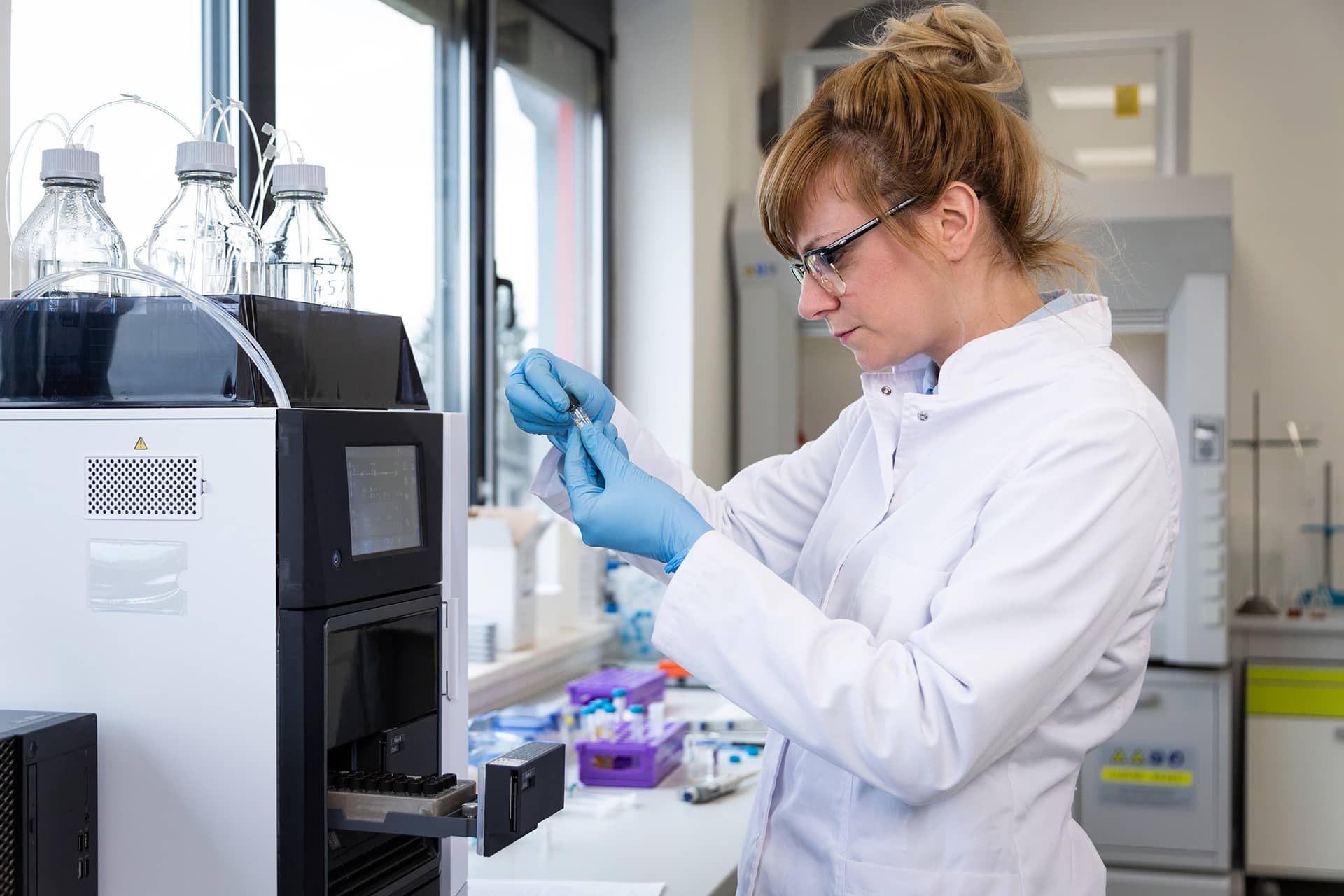Case Study
Better Immunotherapy Outcomes by Improving NK Cell Therapy
Metabolomics is used to increase efficacy of immunotherapy via improving iPSC-derived cell therapy.
Metabolomics can address issues historically problematic with NK cell therapy, resulting in improved immunotherapy efficacy for multiple cancer indications.
Metabolomics can address issues historically problematic with NK cell therapy, resulting in improved immunotherapy efficacy for multiple cancer indications.

The Challenge of Cell-Based Immunotherapy
Immunotherapy is a successful treatment for some cancer types, such as acute B lymphoblastic leukemia.1,2 Cell-based immunotherapy is hampered by limited effector-cell persistence (therapy effects decrease over time) and a lack of on-demand availability.3-5 One type of immunotherapy, CAR-T-cell adoptive therapy, can result in cytokine release syndrome (an inflammatory response), neurotoxicity, or graft-versus-host disease, an issue arising when the patient’s immune system attacks the treatment cells.2
In contrast, natural killer (NK) cells offer several distinct advantages in terms of improved efficacy. NK cells have a strong safety profile,6 do not trigger graft-versus-host disease, and have fewer toxicity issues. However, treatment with traditional NK cells rarely leads to complete remission, treatment responses are seldom durable, and the treatment often requires additional strategies to improve results. Thus, there is a need for NK cell therapy with improved outcomes.
Researchers developed adaptive NK cells that not only have improved metabolic fitness and can exhibit effective antibody-dependent cellular cytotoxicity, but also have the potential to mitigate the severity of graft-versus-host disease, in this case, graft-versus-leukemia.7 These adaptive NK cells were derived from induced pluripotent stem cell (iPSC) which the researchers termed iNK cells. The researchers sought to improve the efficacy of these cells through synthetic modifications.
Metabolomic Insights to NK Cell Therapy
The researchers engineered iNK cells to express a knockout of the ecto-enzyme CD38 that hydrolyzes NAD+ and overexpress IL-15RF and hnCD16 transgenes. They termed their modified iNK cells, iADAPT NK cells. The researchers leveraged the Metabolon Global Discovery Panel to study the phenotypical impact of these modifications in iNK cells. The study found several distinct benefits of iADAPT NK cells, such as higher NAD+ activity due to CD38 knockout. Additionally, researchers noted increased levels of 3-phosphoglycerate and phosphoenolpyruvate showing altered glycolysis. Metabolomic profiling also indicated iADAPT NK cells selectively accumulated amino acids cysteine and homocysteine (cysteine metabolism), with implications for cysteine-glutathione disulfide (L-CySSG) production.
Further, the researchers noted that iADAPT NK Cells had very high levels of L-CySSG compared to other cells, exhibiting ~30% decrease in mitochondrial superoxide activity. Results also indicated CD38 knockout cells produce more L-CySSG, resulting in stronger oxidative stress-resistant phenotypes.
NK Cell Solutions from Metabolomics
The metabolomic analysis indicates a few solutions. First, individuals who are CMV-seropositive have adaptive NK cells that exhibit reduced CD38 levels, correlating to increased oxidative stress-induced cell death resistance. Further, CD38 knockout cells show both resistance to daratumumab-induced fratricide as well as demonstrate metabolic traits akin to adaptive NK cells. These CD38 knockout cells also show increased amounts of metabolites that impact glycolysis and cysteine metabolism, perhaps key readouts of NK activation or activities.
In addition, the metabolomic data demonstrated that iADAPT NK cells result in genome-wide transcriptional alterations that parallel adaptive NK cells. As well, in combination with daratumumab, iADAPT NK cells not only persist in vivo, but also have strong antitumor responses in vivo to counteract multiple myeloma and relapsed, refractory acute myeloid leukemia.
Outcome: Improvements in Accessibility and Efficacy for Immunotherapy
The findings offer potential opportunities for improvement in the future of immunotherapy. By leveraging metabolomics, researchers found that the metabolomic phenotypes related to triple-gene-edited iADAPT NK cells were favorable metabolic and transcriptional features.
Based on the study, iADAPT NK cells could be an off-the-shelf source of cells for multiple cancer immunotherapy applications. Metabolomics is a key driver for that finding, indicating the opportunity for metabolomics to improve our understanding of immunotherapy issues and the potential to identify more effective solutions.
References
1. Brentjens, R.J., Rivie`re, I., Park, J.H., Davila, M.L., Wang, X., Stefanski, J., Taylor, C., Yeh, R., Bartido, S., Borquez-Ojeda, O., et al. (2011). Safety and persistence of adoptively transferred autologous CD19-targeted T cells in patients with relapsed or chemotherapy refractory B-cell leukemias. Blood 118, 4817–4828.
2. Maude, S.L., Frey, N., Shaw, P.A., Aplenc, R., Barrett, D.M., Bunin, N.J., Chew, A., Gonzalez, V.E., Zheng, Z., Lacey, S.F., et al. (2014). Chimeric antigen receptor T cells for sustained remissions in leukemia. N. Engl. J. Med. 371, 1507–1517.
3. Hirayama, A.V., Gauthier, J., Hay, K.A., Voutsinas, J.M., Wu, Q., Pender, B.S., Hawkins, R.M., Vakil, A., Steinmetz, R.N., Riddell, S.R., et al. (2019). High rate of durable complete remission in follicular lymphoma after CD19 CAR-T cell immunotherapy. Blood 134, 636–640.
4. Schuster, S.J., Bishop, M.R., Tam, C.S., Waller, E.K., Borchmann, P., McGuirk, J.P., Jager, U., Jaglowski, S., Andreadis, C., Westin, J.R., et al.; €JULIET Investigators (2019). Tisagenlecleucel in adult relapsed or refractory diffuse large B-cell lymphoma. N. Engl. J. Med. 380, 45–56.
5. Zou, Y., Xu, W., and Li, J. (2018). Chimeric antigen receptor-modified T cell therapy in chronic lymphocytic leukemia. J. Hematol. Oncol. 11, 130.
6. Miller, J.S., Soignier, Y., Panoskaltsis-Mortari, A., McNearney, S.A., Yun, G.H., Fautsch, S.K., McKenna, D., Le, C., Defor, T.E., Burns, L.J., et al. (2005). Successful adoptive transfer and in vivo expansion of human haploidentical NK cells in patients with cancer. Blood 105, 3051–3057.
7. Lee, J., Zhang, T., Hwang, I., Kim, A., Nitschke, L., Kim, M., Scott, J.M.,Kamimura, Y., Lanier, L.L., and Kim, S. (2015). Epigenetic modification and antibody-dependent expansion of memory-like NK cells in human cytomega-lovirus-infected individuals. Immunity 42, 431–442.
8. Woan, K.V., Hansol, K., Bjordahl, R., Davis, Z.B., Gaidarova, S., Goulding, J., Hancock, B., Mahmood, S., Abujarour R., Wang, H., Tuininga, K., Zhang, B., Wu, C.Y., Kodal, B., et al. (2021). Harnessing features of adaptive NK cells to generate iPSC-derived NK cells for enhanced immunotherapy. Cell Stem Cell 28 (12), 2062-2075. DOI: https://doi.org/10.1016/j.stem.2021.08.013




